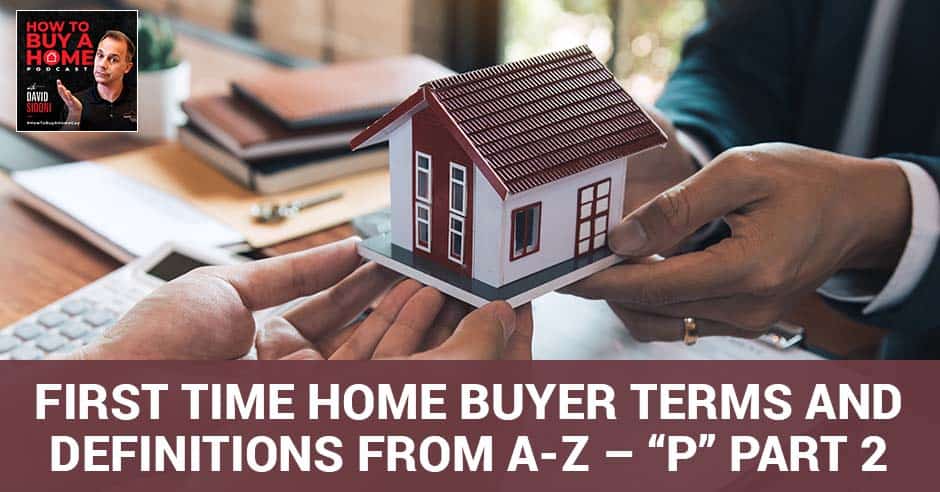
There is no magic pill to take when buying your first home. Your lender or realtor isn’t going to break everything down for you. So take this definition so you can make this home-buying process as painless as possible. Tune in to part 2 of the “P terms and definitions” trilogy.
—
First Time Home Buyer Terms And Definitions from A-Z “P” Part 2
The Glossary Of All Terms You Need To Know To Buy Your First Home – Letter P
Time for more terms and definitions to know when you’re figuring out how you buy a home. This is the letter P, part two.
—
What is happening my How To Buy A Homies? I love you but I cannot believe you all. I spent years of grinding, researching and pouring my heart and soul into this show dropping sick knowledge and mad truth bombs. It turns out the feedback I’m getting is more definitions. Apparently, you all love it when I do these SAT vocabulary-style episodes so you want a glossary.
Let me get this straight. I take all this time. I break down the fiscal minutia of a changing economic landscape and how that affects your monthly net income in regards to you paying for an empty liability, your rent, versus paying for a theoretical asset. Technically, it should be labeled as a liability due to maintenance but not when you factor in the variable of each month’s lost money while you’re renting when adding in the historical safe and positive appreciation returns when you use your home in this long-term fiscal plan but you want more definitions.
This is part two of the P episode. For part two on the P terms, I’m going to have some real fun to start because the first definition gets pretty technical so I’m going to ease you into it. Think of it this way. It’s going to be like first watching TMZ and then after a couple of minutes you switch a channel and end up in this super hard bonus double jeopardy round. We got to get you warmed up first before I nail you with some of this detailed stuff.
Points
The first P we’re working on is going to be Points or buy-down points. It’s funny to me that this term gets tossed around a lot of industries to sound all fiscally fancy. When you’re talking about a point, it usually means a percentage point. Most of the time, a point is a percentage. Maybe you’ve heard the term points when you hear about a Hollywood movie star taking a lower salary and then negotiating points on the back end.
What they’re doing is negotiating a specific percentage of the box office revenue. I want you to ease into this so we’ll start with the TMZ stuff. I googled the best back-end deals. Did you know that Emma Watson used all of her Hermione star power for Beauty and the Beast when she was negotiating her salary? She took only $3 million. That’s relatively low for a big star like that doing a movie and then she took back endpoints as part of her salary.
The film made $1 billion and she ended up making a $15 million total salary when her points weren’t included. Bruce Willis, back in the day, took only $15 million for the movie Six Senses. He made $100 million with his points. Tom Hanks made bank twice with points on Forrest Gump and Saving Private Ryan. Jack Sparrow got some serious pirate booty. $300 million with his points deal for the Pirates of the Caribbean.
That’s all four movies. It’s crazy but when it comes to the Hollywood points deal, to help you understand how points are percentages, it all started with Jack Nicholson as the Joker in the OG comic book movie, Batman with Michael Keaton. What he did back then was he used his star power to negotiate not only a $20 million salary but points on the back end that made him $60 million back in 1989, which adjusted for inflation for about $100 million to do one movie.
Here’s the fun one. Honorable mention. In 2011, there was a big female Hollywood comedic popular star who took points in her movie and made $42 million. What was the star and what was the movie? In 2011, it’s a female-driven lead in a movie. She only took $1 million in salary and made $42 million. You’re going to freak out when you figure out who it is. It is Cameron Diaz in a movie called Bad Teacher. That is all true.
Bad teacher, the movie you may never hear of, she made $42 million for. Why would I tangent this much on actors’ salaries and points? It’s because as the magazine says when they show you a mortified slop-lead-dressed celebrity at a grocery store who got snapped by a paparazzo, that’s the singular correct form for paparazzi.
Under the picture of the magazine proclaim stars. They’re like us. Like the stars, you can use points too. You may have heard the term when it comes to a home mortgage “buying down your rate.” It’s what we call paying points. You can get a lower rate the way it’s working for the 1st-year or a 2-year loan. This might not be the right thing for everyone and not all lenders or loan programs offer buying down points, especially in 2022.

When I’m recording this episode, rates are at a 7% interest rate. These types of programs could be something that if added to your equation for you and your unicorn team to look into and see if it makes the most sense for you and what’s trying to do, options. The way it works is you pay some points at the closing to buy down your interest rate. For most situations, it doesn’t make sense for you to pay it because if you’re only getting it for 1 year or 2, why would you pay at the closing to save monthly? The market is shifting a little bit so if your team can negotiate with the seller to pay for it, see options.
Here’s an example of how this can be done and how you can see that this might be a good thing for you if you can get someone else to pay for it. Say you want to buy a home at what I’m still going to call the average price. It’s a little higher but let’s say $400,000 to make it nice and even. Let’s say that the rate you get with 20% down is 7%. I know you think that’s crazy high but if you read here closely, you’re going to see how we can buy down and use this buy-down hack. If you got to put 20% down, that means you should have about 25% of the purchase price in your liquid cash. That’s a 20% down payment and 2% to 4% in closing costs with a little bit of breathing room there.
You found a home and you know this is the home for you. A home that you’re going to be stoked on for at least ten years or maybe even it’s your forever home. With the high-interest rates, the payments are going to be a stretch for you each month when you have to cut that payment. It’s probably going to be a stretch for the first couple of years. You can buy down the points and lower your interest rates for year 1 and 2. Yes, you can buy an interest rate down.
[bctt tweet=”Interest rates are rising but did you know that you can buy an interest rate down? ” via=”no”]
This is specific to what’s happening. We’ve got crazy high-interest rates in comparison to where we’ve been in the past and cooling home prices. Time for some non-straight line, pretty in-depth math. Grab your TI-84 graphing calculator. Personally, I like the TI-84 CE+ silver model but that’s because I’m a little bit of a purist.
2-1 Buydown
I got my lender to send me the Excel spreadsheet and I put in the numbers for you. If you’re putting 20% down on the average $400,000 price, your loan amount is $320,000. For this example, let’s say you’ve got 25% so you got the 20% down plus a little bit more. Here is how the buy-down program would work for that. There are two options available for most current lenders. The first option is called a 2-1 Buydown. That’s for the first two years.
In the 1st year, you get 12 months at 2 points lower than the 7%. Why they don’t say two percentage points? I don’t know but 7% to 5%, that’s what that means. The second year, you’re going to get one point lower and then you’ll go to the 7% that you’re going to pay for 30 years unless you refinance out of that, which I’m pretty sure you’re going to. Translation. If you have a 7% loan interest rate, in year 1, you’re going to pay 5%. In year 2, you’re going to pay 6% and then 7% for the remaining 28 years.

I don’t want you to be freaking out about 7%. That’s based on October 2022 where the rates are. If you’re a homey, that number does not freak you out at all because if you’re reading my show, you know that interest rates don’t matter in the big picture because if rates go up or stay the same for the next 5 to 10 years, you’re going to be stoked that at least you got locked in at 7% before things went up. If they go down, then you simply have to refinance. You’re not freaking out that I said 7%.
You use that extra money and buy down 5% for the 1st year. Your payment drops from what would’ve been $2,129 to $1,717. That’s saving you $412 a month. In year 2, instead of 7%, which costs you $2,129, you’re going to be 6% and that costs you $1,918, a savings of $210 a month. This 2-1 Buydown of the points costs $7,458. Someone has to pay $7,458 over the 20% down and the 2% to 4% closing costs at the time you close on the property. If you’re following this and you understand what’s going on, you might be thinking, “If I have the extra $7,458 at closing, why would I pay it upfront to lower the monthly payments for the next couple of years? Why don’t I keep it, pay the higher thing every month and use some of that to help me with the payment?”
What if you don’t pay for it? In the current market conditions, if you’ve got a killer team, they can get creative and use this hack. The hypothetical sellers of this average $400,000 home might be super bumming because they realized their home has been on the market for a few weeks and they’re not going to get the $425,000 on their home they thought they would. They thought it was going to happen because Sally’s home down the street sold for $400,000 in the summer and Mary’s home down the street sold for $375 in the spring.
Seller Credits
They thought for sure that the rising market would mean they would get at least $425,000 for their house because it is way nicer than both those gangs down the street. Except now that the market has shifted and you, as the buyer, have more power so they’re back. Seller credits are a thing again. With the right skilled negotiator working on your behalf, you can use that power that you have as a buyer to get yourself a seller credit. Bear in mind, all these new agents that got into the game never had to do this before because they’ve only been practicing real estate in a market when seller credits never even existed.
[bctt tweet=”With the right skilled negotiator working on your behalf, you can use your power as a buyer to get yourself a seller credit.” via=”no”]
If you got a good experience team working for you, you negotiate some form of credit either in the original purchase price negotiation or this request for credit can come after you do your inspection. You might not even have to waive your inspection anymore. Instead of asking them to repair $5,000 or $10,000 worth of stuff or asking them for a $5,000 or $10,000 credit for the issues that you find during your inspection, you simply say, “We found this wrong with the place. How about you give us $7,500 as a credit?”
If the seller gives you that credit, you use it for that point buydown. You’re going to pay your down payment and closing costs and then you’re going to have the seller come in and pay to buy down your rate. You then get the lower rate for the first couple of years without costing you anything extra. If you didn’t negotiate at the beginning, you get to the inspection and you don’t have $7,500 worth that you can ask for, there’s always the second option, which is the 1-year deal.
That simply means that you’re going to be getting 6% instead of 7% for the 1st year. That only cost you $2,525. Let’s say the seller is not going to give you a big $7,500 credit. If you asked for $2,525, you lower your payment to $210 a month for the first 12 months. To emphasize my point, I had another point from part one in the last episode about how there’s no way that I can justifiably and ethically answer the question. If you say, “David, with rates being so high, should I get one of those seller credits to buy down my points and change what I’m doing with my payment structure?” I don’t know.
I don’t know you and everything about your situation. This is something you can do but the people who are going to be guiding, you and giving this decision are the people who know all everything about your short-term, long-term and medium-term plan. They got to know how much money you have. How you’re doing on your reserves? Are the repairs cosmetic or are they necessary? What about the repairs? Are you handy? Maybe repairs are no big deal to you and then we have to figure out everything that’s long-term in your life.
Do you expect pay raises in the next ten years in your career? Why does a low monthly payment in the first couple of years matter to you? Do you invest elsewhere? Maybe you could be moving your money someplace differently. Are you going to stop working at one point and become a full-time caregiver? Is that going to affect changing your monthly income? Do you have a giant round-the-world trip plan for the next year before you have kids so it’s more important for you to take that trip than saving $400 a month on the 1st year and $200 on the 2nd year?
Do you see why there are 1 million different variables that you can only get if you start planning with a team of advocates at least 6, 12 or 18 months before you buy? That’s the reason why I can’t answer that question. I haven’t been doing all this big planning with you for the love of everything that I say on the show every single time. If you get nothing else out of this show, please hear me when I say the buyers that get the best deals are not those elites you see on social media talking about how they got something way below the list price.
It’s not the people saying, “I stole this home. It was such a great deal.” The thing about negotiations and deals is the best deals are made months in advance in preparation. I want you to comprehend and understand that because it’s some of the best advice I can give to any first-time home buyer. The best deals are made in the planning months in advance of you buying the home.
[bctt tweet=”The best deals are made months and months and months in advance of you buying the home. ” via=”no”]
If you want the best deal when buying a home, the killer deal is created a way in advance when you work with a professional team guiding you so when you’re ready to shop, you can utilize the best available options to you. The industry on the whole is not marketing this fact to you. That’s because most of the people who would be marketing that fact to you mean would have to work three times as much and don’t get paid until you close. They want to work as little as possible to get paid.
Realize the people that you work with in real estate, your realtor and your lender, only get paid when you close on the home. There is a business industry standard where they let you flail on your own, figure this all out and then come to them when you are ready to start writing offers. They’ve built their entire businesses on closing the deal with you in as little time as possible. With very little regard, my favorite thing in the world when you’re buying a home is options. All the options that you could have used probably would’ve set you up for a lifetime of financial freedom.

Side Note: Don’t Feel Pressured
Here we go on my world-famous side notes. Some of you out there could be massive over-preparers and when you do go to a unicorn, you might be ready to buy when you talk to them thinking you need another year but you prepared so well before you even talk to somebody. You might be ready to go, which means that the market conditions might be where you want to buy sooner rather than later. it could be, in your best interest, to go ahead and make the move. Do yourself in favor. Don’t confuse about what I’m saying. When you go to someone who takes the time to evaluate your entire total situation and say, “You should be able to get going on this in the next couple of months,” don’t feel pressured and rushed.
If you’re talking to a well-vetted, well-qualified unicorn team or someone that you’ve done all the research for yourself, that’s exciting. If they look at you and go, “You’re in great shape,” your best play is to jump on this and take advantage of X, Y and Z or whatever that is. It could be the current prices, current interest rates or based on your current super-expensive renting situation. For many of you, if you haven’t done a lot of planning before you talk to somebody, it can tend to get a little frustrating trying to do it if you’re randomly googling a realtor.
When you talk to them, you might feel rushed, worse or neglected because you can’t buy what you want. With all that, unfortunately, no, I cannot, I shouldn’t and I’m not going to give you an answer to a lot of your specific questions. I don’t have all the details to be able to understand and give you an answer that’s going to serve you best. That’s a big enchilada and this is a big purchase.
Where were we? P terms and definitions. We only got one of them done so far. That’s the thing about doing a show. Many people are reading these because they want to know the three biggest mistakes. They’re so afraid of everything that’s going on so they want the ten-step PDF download that they can post on their wall. I need to make sure that you understand there are many sales techniques that people are using to get you to work with that realtor or that lender.
They’re designed to get you to reach out to them and work with them. They’re not designed to educate you and give you the big picture. Remember, they’re looking for a quick sale. I may have gone off on a little bit of tangent right there but I want to make sure that you were getting educated so that you can get the best deal for you and your family, not the fastest deal.
[bctt tweet=”Many lenders and realtors are just trying to look for a quick sale. They’re not there to educate and give you the big picture.” via=”no”]
Power Of Attorney
Let’s get back to some technical definitions. P, Power of Attorney. Google says that’s a legal document that authorizes another person to act on one’s behalf. Power of Attorney is sometimes used in real estate if a buyer or seller is incapacitated, out of the country or otherwise needs someone else to sign the documents on their behalf. They can grant complete authority or it can be limited to certain acts or certain periods of time.
I could see that as we’re going alphabetically, we’re about to get into all the prefix definitions that start with pre. There are a bunch of these in real estate. Instead of presuming that you have another 25 minutes to let me present into your eyeholes, let’s call the piece for this episode. I will tease the exciting upcoming trilogy that nobody asked for. Like, share, rate and review. Follow me on YouTube, TikTok and Instagram. Here’s my big tease, the trailer for the exciting trilogy. The journey began with partial payments and unnecessary urination jokes. You were captivated as points were explained to you with a passion that could only be described as unwarranted and excessive. Stay tuned for the dramatic conclusion P Part 3. You can do this.
Important Links
- Part One – Past Episode – Ep 136 – First Time Home Buyer Terms And Definitions From A-Z – “O-P” – Part 1
- YouTube – How To Buy A Home
- TikTok – How To Buy A Home
- Instagram – David Sidoni
This podcast was started for YOU, to demystify things for first time home buyers, and help crush the confusion. After helping first timers for over 13 years, I knew there wasn’t t a lot of clear, tangible, useable information out there on the internet, so I started this podcast. Help me spread the word to other people just like you, dying for answers. Tell your friends, family, and perhaps that random neighbor you REALLY want to move out about How to Buy a Home! A really easy way is to hit the share button and text it to your friends. Go for it, help someone out. And if you’re not already a regular listener, subscribe and get constant updates on the market. If you are a regular and learned something, help me help others – give the show a quick review in Apple Podcasts or wherever you get your podcasts, or write a review on Spotify. Let’s change the way the real estate industry treats you first time buyers, one buyer at a time, starting with you – and make sure your favorite people don’t get screwed by going into this HUGE step blind and confused. Viva la Unicorn Revolution!
Instagram @DavidSidoni
Tik Tok @howtobuyahome
